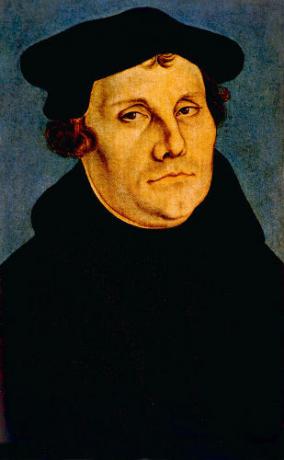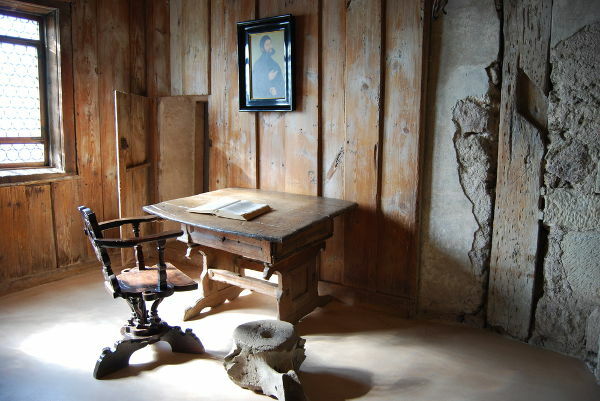martinLuther he was recorded in history as a Catholic monk who started a movement to challenge the doctrine of the Catholic Church in the 16th century.
Luther did not agree with some practices of the Church at the time and sought to carry out a reform within Catholicism, questioning some actions through the 95 theses.
Luther's action sparked a great movement, which became known as Protestant Reformation, which resulted in a schism within Christendom in Europe. Thus, the Protestantism, a wing of Christianity that has different interpretations from what is practiced by the Catholic Church.
Accessalso: What was the role of the Jesuits in Counter-Reformation?
Birth and education of Martin Luther

Martin Luther (Martin Luther, in German) was born on November 10, 1483, in the town of Eisleben, which at the time was part of the Holy Roman Empire. His parents were called Hans Luther and Margarethe Luther (João Lutero and Margarida Lutero, translating into Portuguese). His family belonged to the petty bourgeoisie and had prospered from working in copper mines.
Luther spent part of his childhood in Mansfeld, where his father worked. Luther's biographies tell that he had a very strict upbringing, but that his parents dedicated themselves so that he would have a good education. Before entering university, Luther studied at Mansfeld, Magdeburg and Eisenach.
In 1501, at the age of 17, Martinho Luther joined the University of Erfurt, where he went to study law to become a lawyer – a very prosperous career at that time. Luther's entry into this course was because of his father's desire to see his son become a lawyer. Luther was devoted to studies, but in 1505 he abandoned the law and entered ecclesiastical life.
Accessalso: What is the difference between religion and sect?
Lifeecclesiastical of Martin Luther

Luther's entry into the religious career is due to a particular episode that took place in the year 1505. On July 2, Luther was traveling from Mansfeld to Erfurt, after spending a few days with his family. Along the way, a storm hit him and lightning struck an oak tree that sheltered Luther from the rain.
Fearing for his life, Luther made a promise to St. Anne that he would become a monk if he escaped with his life. After he escaped, Luther went ahead with his promise - which deeply displeased his father. So, a few weeks after this event, Luther entered the convent of the Augustinian Hermits of Erfurt.
In April 1507, Luther was ordained a priest, and the following year he entered the University of Wittenberg to study theology, earning a BA in Bible studies. Soon after, he began teaching theology and, in 1512, obtained the title of doctor of theology. After obtaining his Ph.D., Martin Luther continued to teach at Wittenberg.
The first Mass celebrated by Luther was on May 2, 1507. In 1508, Luther made a visit to Rome, the seat of the Holy See, for questions relating to the order of the Augustinians. Historians comment that this trip to Rome left a bad impression on Luther, due to the lack of spirituality and corruption present among the religious.
Between 1513 and 1518, Luther taught several courses at the University of Wittenberg, all of them on biblical teachings. During this period, Luther conducted Bible studies in Greek and Latin, and it was the reading of the Bible that was great starting point for Luther, unconsciously, to initiate a great movement of reform in the Church.
Martin Luther's Protestant Reformation
Through Martin Luther who triggered the Protestant Reformation, but it is important to know that, before him, other names within the Catholic Church questioned the situation in which the church became found. JohnWycliffe and JanHus they questioned the Catholic Church's accumulation of power, the sale of indulgences, and corruption among the clergy.
The Protestant Reformation didn't just happen because of Luther's religious dissatisfaction with the Church's situation. This movement was only possible because it achieved popular support and important nobles from the region of the Holy Empire, in the context of the 16th century. The nobles saw in Luther's action a way of weakening the pope in order to diminish the Church's influence in secular power. Furthermore, the reform was seen as a way to get rid of taxes levied by the Church. For this reason, many peasants saw the Reformation as a way to combat the oppression and poverty in which they lived. A series of peasant revolts took place during the Protestant Reformation, but Luther did not support them because of the violence manifested in them.
Luther, in turn, suffered from much that he saw in the Church. He started preaching from 1514 onwards, becoming known as a good preacher. Direct contact with the faithful and the Church made him question a very common practice at the time: indulgences, the practice of paying for the forgiveness of sins and for salvation.

Luther had numerous criticisms of the way Church members behaved, and the issue of indulgences is just one of them. In early 16th-century Germany, indulgences were part of a project by the Holy See to build St. Peter's Cathedral, and were heavily charged. Luther's criticisms of indulgences were marked in the 95 theses, highlighting the 76th thesis: “We affirm, by the contrary, papal indulgences cannot nullify even the smallest of venial sins as far as their fault"|1|.
Reading the Bible led Luther to new interpretations of the Christian faith and this led him to conclude that each person's salvation was obtained by faith, therefore, according to the biblical text, “the just shall live by faith”. This position made the question of indulgences even more absurd in Luther's eyes and hence his revolt against this practice.
Hence, Luther wrote a document with a series of comments on the practices of the Church. This document became known as “95 theses” and began the Protestant Reformation. Luther's idea at that time was not to separate from the Church, but to reform it. Protestant tradition says that Luther nailed the 95 theses to the door of the church in Wittenberg, but historians have never proved this and it is believed that the 95 theses would have been sent as a letter for the Archbishop of Mainz, Albert of Brendenburg.
In any case, Luther's document ended up being spread across Europe and this is due to the invention from the press. Through it, the 95 theses of Luther were replicated and spread throughout Europe, making the movement to contest the Catholic Church gain strength. The preaching of the theses at the door of the church in Wittenberg took place in October 31, 1517.
This action triggered an intense religious dispute within the Catholic Church and resulted in the excommunication of Luther, in January 1521, after years of debate between Church authorities and Luther. During this period, Luther continued with his work and his theological studies. He formulated the principle of five soles, that are:
Solefide (only faith);
Solescript (only the Scripture);
Soluschristus (only Christ);
Solegraciousness (only grace);
SoliOf theglory (Glory only to God).
Accessalso: Nietzsche's critique of Christian morality – a philosophical controversy
Worms Diet
In 1521, Emperor Charles V summoned Martin Luther to provide clarification during the Diet of Worms. In that event, Luther reinforced what he believed and refused to deny what he had said and written since 1517. After the Diet of Worms, he was allowed to return to Wittenberg, but was eventually convicted of heresy.

Luther's participation in the Diet of Worms ended up making his message even more popular among some nobles of the Holy Empire. Luther turned out to be "kidnapped" per Frederick the Wise, prince of Saxony, who hid him in his castle, located in Wartburg. Frederico actually was protecting Luther being killed after the Diet of Worms.
During his refuge in Wartburg, Luther ended up translating the bible into the German language, making the sacred texts accessible to the faithful. He left his refuge at Wartburg in late 152.1 and returned to Wittenberg where he continued to deliver sermons and counsel the faithful.
Martin Luther's Personal Life
Luther abandoned celibacy, which marked the lives of those who follow religious life in the Catholic Church. In 1525 he married Catherine de Bora (Katharina von Bora), a nun who left her convent with the advent of the Protestant Reformation. Luther and Catherine had sixsons: Hans, Elisabeth, Magdalena, Martin, Paul and Margarethe.
Martin Luther died on February 18, 1546, aged 62, for unknown reasons. Throughout his life, Luther was in poor health due to various chronic problems, such as Ménière's disease. It is also believed that he had intestinal problems caused by enterocolitis and that he suffered from kidney stones.
Note
|1| 95 theses of Luther. To access, click on here.
By Daniel Neves
History teacher
Source: Brazil School - https://brasilescola.uol.com.br/historiag/martinho-lutero.htm

